We Tasted And Ranked 11 Non-Dairy Cheeses From Worst To Best
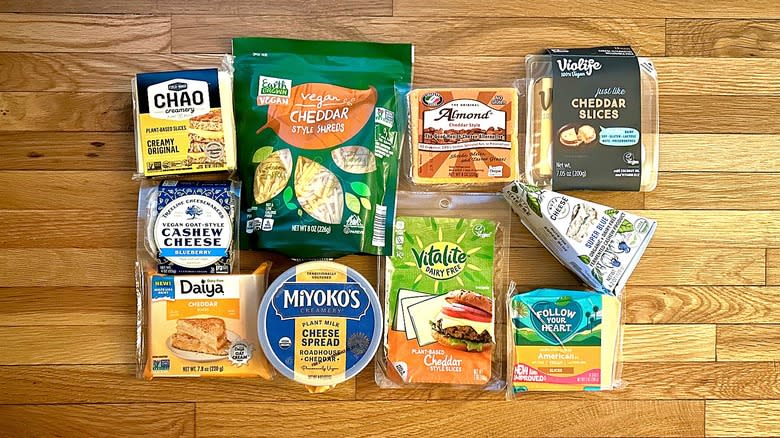
According to Grand View Research, global vegan cheese sales reached $2.43 billion in 2021 and are anticipated to top $7.10 billion by 2030, with an annual growth rate of 12.6% between 2022 to 2030. This exponential growth of the vegan cheese retail sector is reportedly driven by several factors, including an increase in those diagnosed with food allergies, concerns over the sustainability of dairy production, and enhanced awareness surrounding purported animal cruelty among dairy cattle, particularly among millennials. Europeans led the way in total market share at 35%, while cashew-based products dominated total sales at 35%.
As an individual who is a part of that percentage of people diagnosed with cow's milk sensitivity, I have slowly been converting my cheese consumption habits to incorporate more plant-based varieties. Generally speaking, I have mixed reactions to the quality of plant-based, vegan cheeses. Of the ones I have eaten, many lack the texture, satiety factor, and meltability of dairy cheese, even if their flavor is similar.
That said, new brands are constantly being introduced with improved recipes intended to mimic real cheese more accurately. I decided to put these plant-based varieties to the ultimate taste test. I picked up as many different brands as I could find. I tasted every brand straight from the package and melted, assessing each based on aroma, texture, flavor, and meltability. While certain brands were unsurprising in quality, others disappointed more than anticipated. Read on to see how these 11 non-dairy cheeses ranked from least to most favorite.
Read more: What These Imitation Foods Are Actually Made Of
Miyoko's Creamery Cheese Spread Roadhouse Cheddar
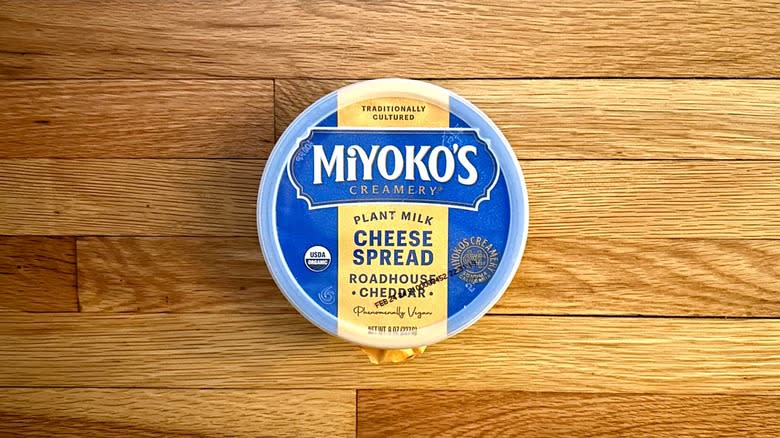
Miyoko's Creamery is an artisanal plant-based creamery located in Sonoma, California. It sources certified organic cashews from Vietnam to craft its vegan, gluten-free, soy-free Roadhouse Cheddar Cheese Spread. This cheese is also made from coconut oil and a proprietary blend of vegan cultures designed to obtain the texture of real cheese without dairy. It features miso, which is intended to confer an umami-rich flavor,
Where this cheese shone was its texture. It was super creamy, did not have the typical graininess I have previously experienced with nut-based cheeses, and had maximum spreadability, making it ideal for dipping or turning into the base for a vegan queso dip. Unfortunately, its positive attributes end there.
The aroma of this cheese spread almost had a Velveeta-like nose, but that was where the similarities ended. Its flavor was exceedingly sour in a very unbalanced way. While I enjoy a sharp cheddar cheese, the level of acidity in this cheese overwhelmed even the rich, umami flavors of the miso. The cheese did benefit a hint from being warmed in the oven, but not enough for me to want to purchase it again. For this reason, it landed last on our ranking of non-dairy cheeses.
Lisanatti Foods The Original Almond Cheddar Style
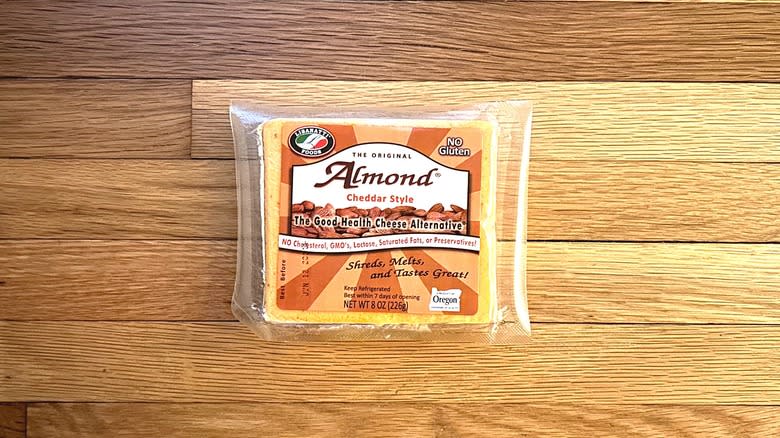
Lisanatti Foods has been making alternative cheese products since 1976. I picked up The Original Almond Cheddar Style because its label indicates it is "The Good Health Cheese Alternative," made from almonds that shreds and melts well. I failed to read the nutritional label before purchasing and sampling this cheese. If I had, I would have realized this is not a plant-based cheese. The second primary ingredient in this non-cheese is casein, a milk protein.
This cheese is neither vegan nor suitable for those with a dairy allergy. It is acceptable for anyone who may be lactose intolerant or vegetarian. That said, I felt a little hoodwinked by the whole thing and was confused by what the exact market for this cheese is supposed to be.
While the cheese had a relatively convincing cheddar aroma and appeared to have a decent texture when I first cut into it, I quickly lost interest when I took a bite. The texture ended up being somewhat plasticky, and the flavor was purely that of almond. While I like almonds, that isn't what I was hoping for.
Additionally, this cheese did not melt so much as it softened and ended up chewy. Despite that, it did taste a modicum better heated than in its pure form. Overall, I listed it toward the bottom of this ranking for its quality and somewhat healthy halo-like labeling that insinuates it is a cheese alternative when it is neither plant-based nor dairy-free.
Nuts For Cheese Super Blue
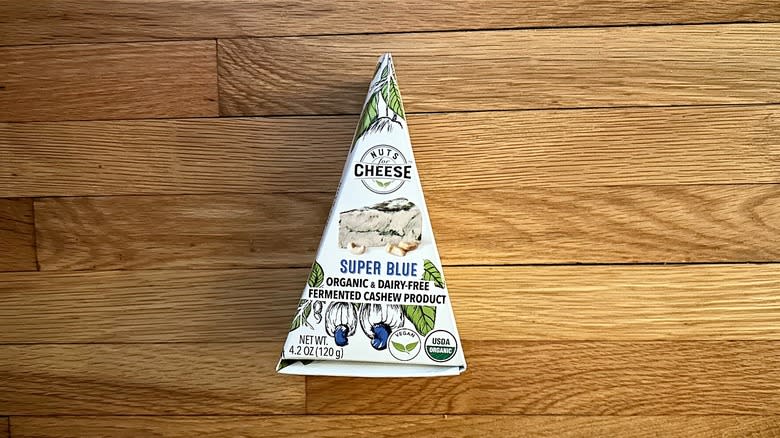
This blue cheese facsimile from the Canadian brand Nuts for Cheese looked promising at the outset, particularly for someone who loves blue cheese even if generally does not love me back. The cheeses from this brand are plant-based, gluten-free, soy-free, lactose-free, dairy-free, and non-GMO.
They are made from cashew milk that is fermented with a proprietary culturing agent made in-house called Rejuvelac. Rejuvelac is obtained from sprouted, organic quinoa and designed to help mimic the flavor and qualities of full-dairy cheese. The Super Blue is also made using miso for umami flavor and spirulina, a blue-green algae often used to confer a slightly bitter savoriness and the quintessential veining associated with blue cheese.
When I opened the package of this cheese, the cheese had an aggressively cashew-forward nose. It was also exceedingly creamy versus having some element of crumbliness, which is typical for blue cheese. The texture was odd but not altogether unappealing. It was spreadable and made for a good cracker topping.
Where this cheese lost me was its flavor. It was overly acidic and did not have that funky taste that a good blue cheese is known for. Though there were notes of umami popping through in the aftertaste, they were not aggressive enough to counterbalance the intense sour flavor left behind on my tongue. This cheese also did not melt particularly well, though the heat did mellow out its flavor. Though I did not dislike this cheese, I did not enjoy it well enough to want to invest in it again.
Treeline Cheesemakers Vegan Goat-Style Cashew Cheese Blueberry
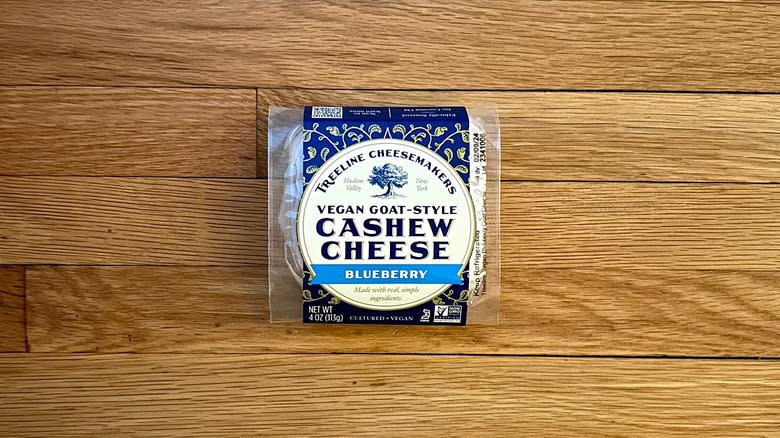
Next on this ranking of non-dairy cheeses is the Vegan Goat-Style Cashew Cheese Blueberry flavor from Treeline Cheesemakers. This cheese was voted Best Vegan Cheese by USA Today's Reader's Choice Awards, so I had high hopes for it. It is a cashew-based cheese that is vegan, gluten-free, soy-free, lactose-free, sesame-free, dairy-free, non-GMO, and Kosher, and uses no coconut or palm oil.
The texture and aroma straight from the packaging was convincingly that of fresh goat cheese. It is creamy and spreadable, with a hint of blueberry coming through when you cut into it. The flavor has the distinct sourness that characterizes a real chevre, even if it lacks a bit of the grassiness you generally taste when eating goat milk cheeses. The cashews are pleasantly nutty but dominate in flavor, with the blueberry being secondary.
This cheese also did not melt but softened in the oven. Though I found this cheese tasty, it did not impress me the way I anticipated it would based on its critical acclaim. That said, it is the first of the non-dairy cheeses I sampled that I would buy again. It was yummy spread onto crackers and paired with nuts and fruit on a mock cheese board. I'd be interested in sampling some of the other cheeses produced by this brand from the Hudson Valley of New York.
Vitalite Dairy Free Cheddar Style Slices
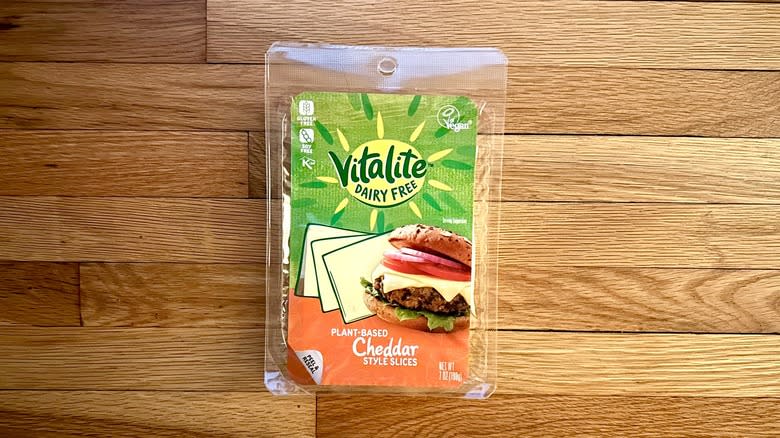
The Cheddar Style Slices from Vitalite Dairy Free rank next on our list of non-dairy cheeses. These plant-based, gluten-free, soy-free, vegan slices are made from water, coconut oil, various starches and gums, and flavorings to achieve something akin to real cheese. What I appreciated about this particular brand was that it was not made from a nut base, which made it more neutral in flavor than many of the other plant-based cheese facsimiles.
Though its aroma was distinctly cheddar-like, its texture was somewhat dry, making it less appealing when eaten straight up than the others I sampled. That said, its flavor wasn't awful. It did have elements of cheddar and a relatively pleasant aftertaste. My only minor criticism in the flavor department was a marked acidity that was unbalanced. This cheese did melt quite well and improved in both flavor and texture when heated through.
If I had to give it a grade, it would be a solid C -- average but perfectly passable. There was nothing remarkable or revolutionary about this cheese. It would work for a sandwich or a vegan macaroni and cheese recipe.
Earth Grown Vegan Cheddar Style Shreds
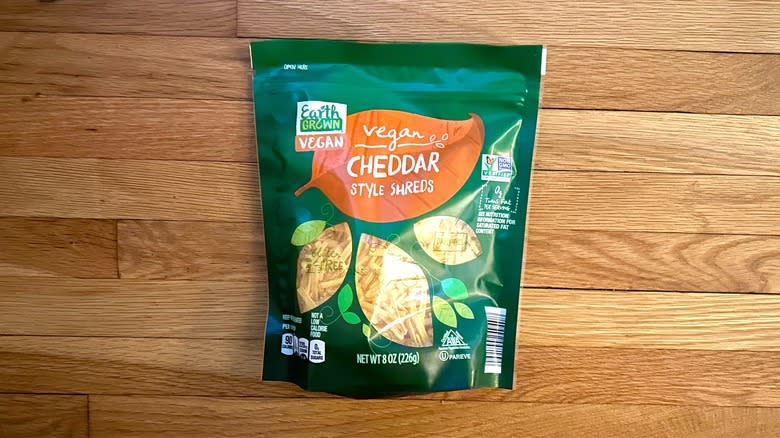
In sixth place on my ranking of non-dairy cheeses is the Earth Grown Vegan Cheddar Style Shreds that comes from Aldi. This line of non-dairy cheeses is vegan, dairy-free, gluten-free, non-GMO, and Kosher. It is made from water, coconut oil, starches, potato protein, and flavorings for a pre-shredded blend that is easy to add to pizzas, quesadillas, or other recipes where you want to melt it.
The taste straight from the bag is neutral, if not slightly starchy. This is common with most shredded cheeses, both dairy and non. They often include anti-caking agents that keep the shreds apart, which is necessary but impacts the overall texture and flavor adversely until melted. The aroma is distinctly potato-forward, which was odd but not off-putting. Once melted, this cheese developed a more convincing cheddar-like flavor and aroma. It also did have a pleasant texture that would work well in recipes.
This mock cheese is a step above others I sampled but not as nuanced in flavor as the top-ranking non-dairy options. I'd give it a B grade overall. It will get used, and if you want to swap out your usual shredded cheddar with something non-dairy to cook with, you should pick up products from this brand available at Aldi.
Violife Just Like Cheddar Slices
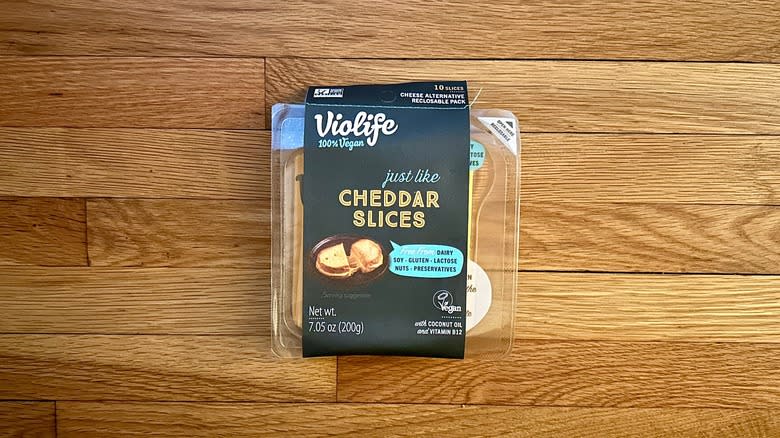
Up next on this ranking of non-dairy cheeses are the Violife Just Like Cheddar Slices. These cheese slices are produced by a company based in an all-vegan community in Thessalonica, Greece. These products are plant-based, vegan, non-dairy, non-GMO, gluten-free, lactose-free, soy-free, nut-free, and preservative-free. They are made from water, potato starch, tapioca starch, natural flavorings, and colorings and are fortified with vitamin B12.
When I opened this packaging, the slices had a bit of a synthetic, plasticky nose. This may have been transferred from the packaging, but it was noticeable nonetheless. The texture of these slices straight from the container was also a bit stiff, dry, and rubbery. The flavor, on the other hand, was dynamite. It had a distinct cheddar-forward taste that was quite convincing.
Where these slices shone was when melted. They did so quite well, and their flavor, texture, and aroma were markedly improved by heat. While I may not eat these slices on a sandwich as-is, I would use them for grilled cheese or a quesadilla. I would give this non-dairy cheese a solid B+ grade.
Daiya Cheddar Slices
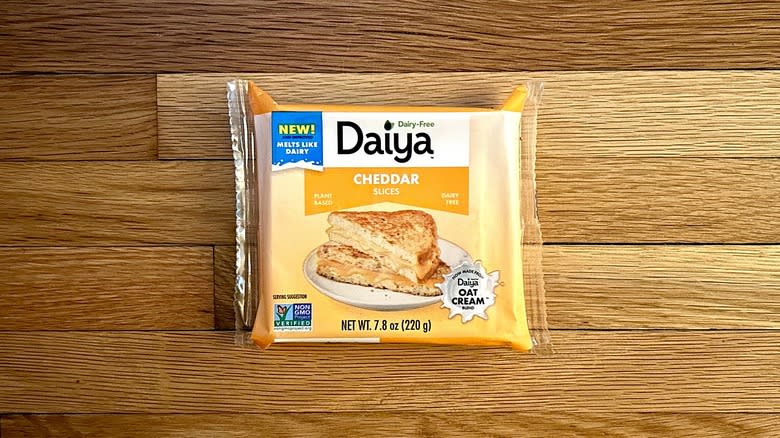
Daiya, pronounced "Day-Ya," has produced plant-based cheese since 2007. Its name combines the words "dairy" and "Dāya," which means mercy, kindness, and compassion in Sanskrit. All its cheeses are gluten-free, dairy-free, nut-free, vegan, and non-GMO. The Cheddar Slices are produced using a proprietary blend of oat flour, pea protein, cultures, and enzymes that are mixed with coconut oil, starches, flavorings, colorings, and Konjac flour, which is often used as a binder for gluten-free products and helps to create a more palatable mouthfeel.
The aroma of this mock cheese is distinctly cheddar. Its texture from the packaging is a bit dry and rubbery but is somewhat more pliable than the others I sampled. Its flavor is a tad on the salty side but not overly saline. It is nutty with a clear oat milk presence. This isn't ideal, but it is flavorful enough.
Again, this cheese was elevated to a different level by being heated. It melted nicely, and its flavor became far more distinctly cheesy. It would be ideal in a grilled cheese sandwich, melted into a quesadilla, or added to a macaroni and cheese dish. I'd give this cheese a solid A- grade.
Kraft NotCheese Cheddar Style
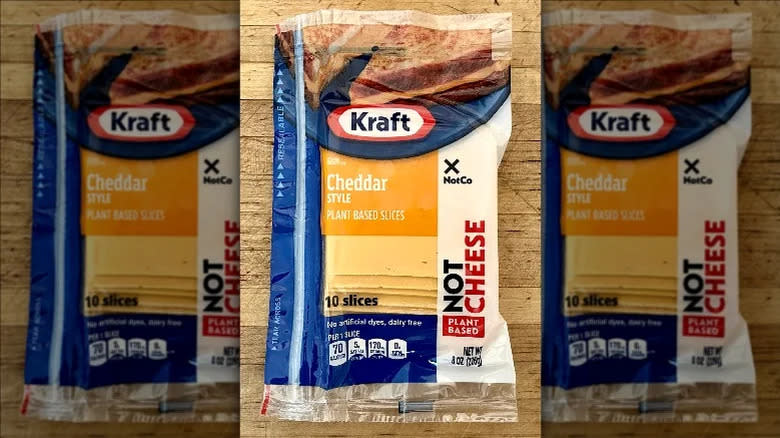
In third place on this ranking of non-dairy cheeses is the relatively new plant-based Cheddar Style from Kraft NotCheese. These vegan cheeses are produced using a proprietary blend of coconut oil, modified food starch, chickpea protein, maltodextrin, natural dyes, and flavorings. These slices were produced using AI technology to analyze the specific plants with similar cellular structures to each cheese type to create the ultimate aroma, texture, and taste.
For the most part, these cheese-like facsimiles do not disappoint. They have suitably cheddar-like aroma and flavor, and their texture, while not exactly like cheese, was more supple than other non-dairy brands we sampled. Though this cheese did not melt as well as some, it got somewhat creamy under more intense heat. Heat did not markedly improve the quality of the cheese in terms of flavor, which was already quite good.
Overall, this is one of the best non-dairy cheeses I have had. My only qualm is that it is made with chickpea protein, which can be challenging to digest for more sensitive stomachs. That said, you cannot detect the legumes in the flavor, which is a win. I would give these non-dairy cheese slices a solid A- grade.
Follow Your Heart American Slices
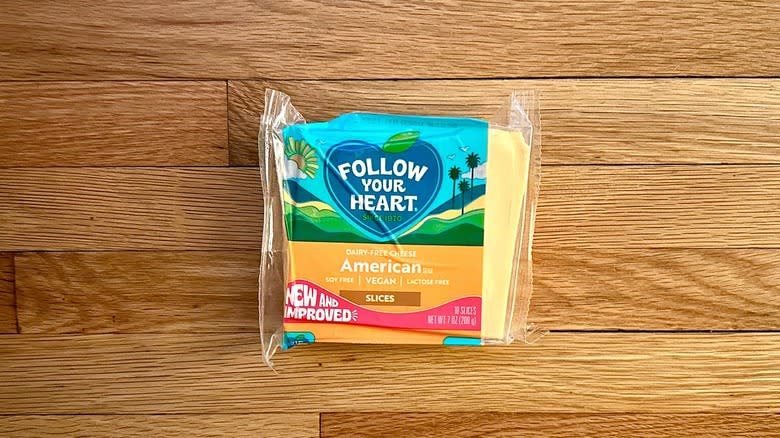
The Follow Your Heart brand has been making high-quality plant-based products since it emerged in Southern California in the 1970s. This company has a hippie vibe, is obsessed with sustainability, and takes its products very seriously. The allergen protocols listed for its products and facilities are extensive and impressive. The American Slices are dairy-free, soy-free, gluten-free, lactose-free, Kosher, vegan, and non-GMO. They are made from water, coconut oil, a blend of potato and corn starches, and natural flavorings.
From the get-go, I was impressed with these slices. Their aroma and texture were like the dairy iteration of American cheese, if not slightly denser. The flavor is quite sharp and has a convincing full dairy savoriness without that starchy residue that has been common with all the plant-based, non-dairy cheeses.
This cheese also melted spectacularly, making it a go-to directly from the package or mixed into a recipe. Overall, these American slices get a solid A grade from me. I'd purchase them again.
Field Roast Chao Creamery Creamy Original
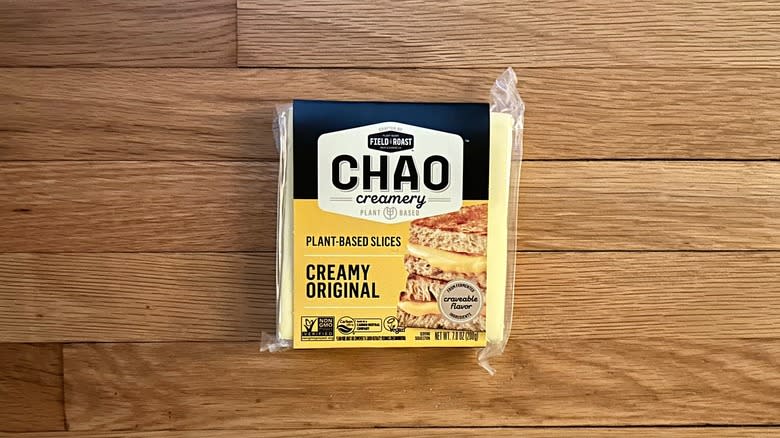
The Field Roast is a chef-led brand that began in Seattle, Washington, in 1997 with a line of plant-based sausage-like products. It has since expanded its repertoire to include myriad products, including the Creamy Original Slices from Chao Creamery. While these products are plant-based, vegan, and non-GMO, they are not organic and contain soy. It is unclear whether they are gluten-free. The products are made from a combination of coconut oil, potato and corn starches, and myriad flavorings to mimic real dairy.
The result is convincing, though the initial aroma is distinctly soy-forward. Its texture is quite a bit more pliable and chewy than the other brands, tearing the way real cheese slices do when you pull them apart. The flavor of this cheese is the most nuanced, even if it is mild, having a complexity that mimics actual dairy. It also melts quite well, meaning you can eat it as-is or in any recipe.
This product was comfortably in the lead among the non-dairy cheeses I ranked. Though I'd only give it an A grade, that is because no matter how good a plant-based cheese is, it will never compare to the real deal. Despite that, this is a great product, and I will gladly add it to my non-dairy cheese repertoire.
Read the original article on Daily Meal.

